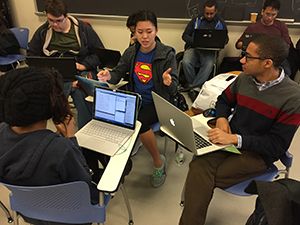In this section, Kyle Keane shares how he encourages participants to view each other as resources for learning. He also discusses how dynamic team-building sessions give participants an opportunity to tap into their peers’ skills.

Participants collaborating in the Unity workshop. (Image by H. Sharon Lin, MIT OpenCourseWare.)
Teammates as Resources for Learning
In this workshop, I routinely emphasize the importance of using teammates as resources for learning. My message is this: If you know something, teach it to someone. Don’t be selfish. We’re in here to learn together. If you teach people what you know, you’re setting an example for others to teach you when they know things you don’t.
It’s during team formation sessions that participants have an opportunity to put this philosophy into practice. It’s a very dynamic (and energizing) process! I encourage teams to yell out what they need from their peers in the room: “We need somebody who knows how to code!” or “We need somebody who knows how to draw textures into Unity!” There’s usually somebody in the room who will say, “Cool. I have that skill. I’ll give it to you.”
Sometimes it can be challenging to form 10 solid, mixed disciplinary teams in a workshop of 30 participants. Bigger workshops of 60, 80, or even 1,000 participants would be fantastic. Think about how many different skills teams could leverage in a setting like that! So many more resources!
Keeping Teams Fluid
"If you know something, teach it to someone. Don’t be selfish."
I explicitly communicate to participants that if they don’t want to work with their team, if they’re not gelling, or if it’s just not the right mix of skills, to stay fluid and keep moving. I encourage them tell their teammates thank you and go find another team. If somebody leaves your team, and doesn’t want to work with you, no hard feelings. These situations are opportunities to coach them in the interpersonal aspects of collaboration.
Usually some of the mini project teams break apart and dissolve. Participants go on to form different teams and work on different projects. This is a perfectly acceptable (and productive) outcome.










